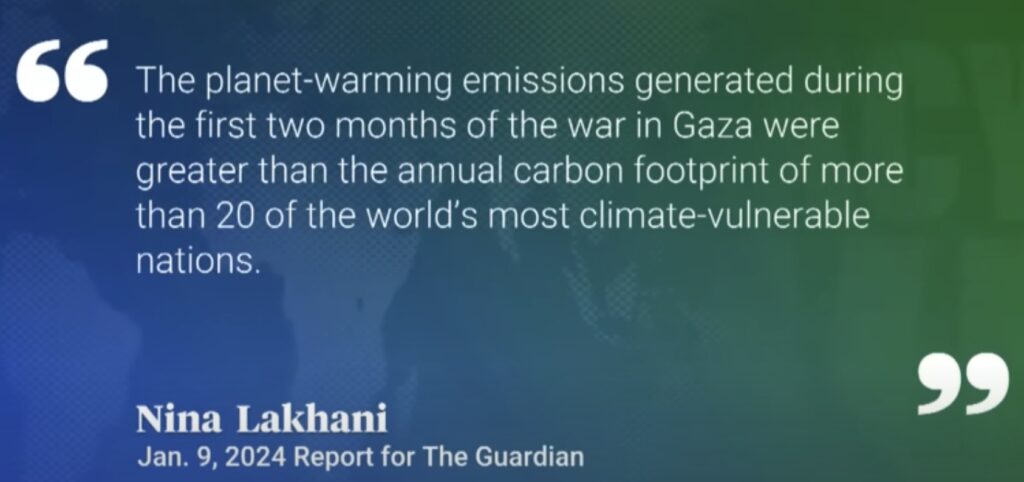
Editor’s Note: This article was originally published in Common Dreams.
‘ Though the vast majority of the estimated climate cost comes from the future rebuild, study authors also looked at the immediate climate emissions from wartime activities, most of which came from flights by Israeli fighter jets and U.S. cargo planes that supplied weapons, fuel, and other supplies. There were 244 round-trip cargo flights from the U.S. to Israel during the four-month study period . . . ‘
In addition to its death toll, Israel’s war in Gaza comes at great cost to the climate, mainly because of the emissions that will be required to reconstruct tens of thousands of buildings there, a study published Thursday shows.
The study looked at the first four months of the war, during which time the authors estimated that some 156,000 to 200,000 buildings were destroyed or damaged in the Gaza Strip. The resulting climate costs were greater than the annual emissions of the world’s 135 lowest-emitting countries put together, the study, which was published in the SSRN and is currently under peer review, shows.
“While the world’s attention is rightly focused on the humanitarian catastrophe, the climate consequences of this conflict are also catastrophic,” Ben Neimark, a co-author and lecturer at Queen Mary University of London, toldThe Guardian.
Though the vast majority of the estimated climate cost comes from the future rebuild, the study authors also looked at the immediate climate emissions from wartime activities, most of which came from flights by Israeli fighter jets and U.S. cargo planes that supplied weapons, fuel, and other supplies. There were 244 round-trip cargo flights from the U.S. to Israel during the four-month study period.
Experts not affiliated with the study, which was an update on earlier work, responded by expressing outrage at the multiple layers of Western complicity in the Gaza onslaught.
“Quite apart from the unspeakable destruction in Gaza and across Palestine, this report lays bare the hypocrisy of Western nations who moralize about the perils of climate breakdown and the responsibility of every nation to protect the planet—all the while funding, aiding, and enabling the Israeli regime’s catastrophic war and its implications for those affected by ongoing and future climate change,” Zena Agha, a Palestinian-Iraqi policy analyst at Al-Shabaka, the Palestinian Policy Network, a think tank, told the paper.
Patrick Bigger, a study co-author and research director at the Climate and Community Project, has separately called for a cease-fire and an end to apartheid in Palestine, arguing that the “climate crisis in Palestine cannot be detached from the Israeli occupation.”
The people of Gaza, who prior to the war used solar panels to an exceptional degree, are themselves particularly vulnerable to the impacts of climate change, authorities there say.
The biggest threat to Palestinians before the war was the climate crisis, Hadeel Ikhmais, head of the climate change office at the Palestinian Environmental Quality Authority, told The Guardian, referring to rising sea levels, extreme heat, and increased occurrences of flooding and drought.
“As long as this war continues, the implications will be exacerbated with horrific consequences on emissions, climate change, and hindering climate action in Gaza,” he said.
The environmental impacts of the war go well beyond the contribution to climate change coming from new emissions. “Gaza’s water, soil, and air have been devastated,” Al Jazeerareported earlier in the war.
In its assault on Gaza, the Israeli military had by March destroyed more than 2,000 agricultural sites, including 40% of all used farmland, according to research by Forensic Architecture, a London-based research group, which called the destruction a “deliberate act of ecocide.” Humanitarian groups have suggested that the destruction is deliberate and that starvation is being used as a “weapon of war,” as Human Rights Watch has repeatedly argued.
The SSRN study, full of “conservative” estimates, likely underestimates the climate impact of the war, as many factors could not be precisely accounted for, especially given military secrecy regarding emissions. Globally, military emissions account for roughly 5.5% of total emissions, according to a recent report, but are not required to be reported to the United Nations Framework Convention on Climate Change.
However, new findings released by a U.N. agency on Monday indicate that the SSRN study may have slightly overestimated the number of destroyed buildings in Gaza. About 137,000 buildings had been damaged, destroyed, or possibly destroyed by May 3, the United Nations Satellite Center concluded—which, though a bit less than the SSRN estimate, is still more than half of the buildings in Gaza, by the agency’s estimate.
Regardless of the exact figures, legal experts have accused Israel of “domicide”—”the mass destruction of dwellings to make the territory uninhabitable,” as defined by an editor at The Guardian.
The continuing war, coupled with climate-related extreme weather events, could jeopardize Palestinian rights still further, experts said.
“One of the serious consequences of the war in Gaza has been the massive violation of the right to a clean, healthy, and sustainable environment… which represent a serious risk to life and the enjoyment of all other rights,” Astrid Puentes, the U.N.’s special rapporteur on human rights and the environment, told The Guardian. “The region is already experiencing serious climate impacts that could get even worse.”
